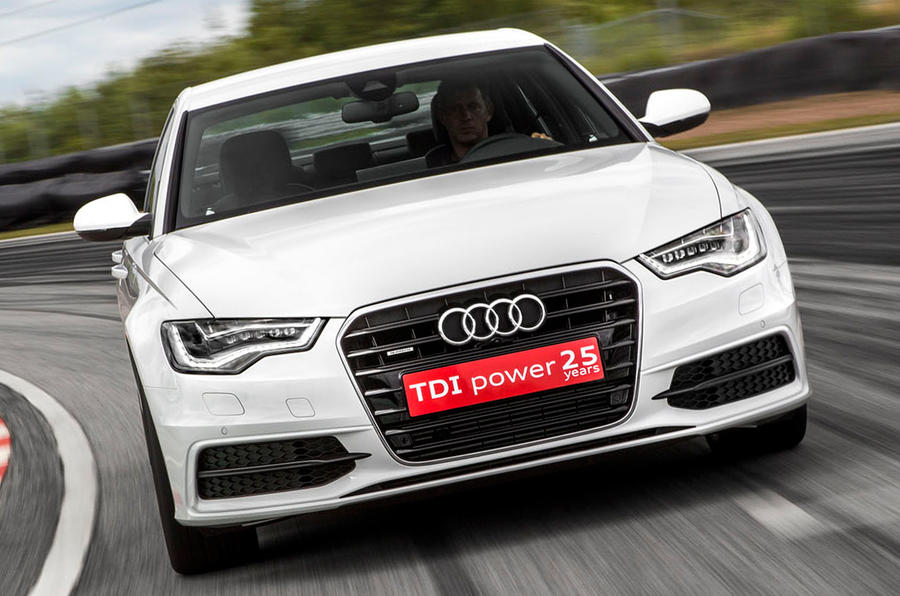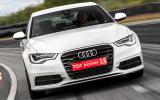What is it?
Twenty years ago, the notion that a diesel-powered car could ever seriously challenge an acknowledged, upper-echelon performance car on track would have been ridiculous.
Now it’s becoming a reality in the form of this Audi A6 concept, a second ‘diesel RS’ prototype to join the RS5 TDI concept we tested recently.
Like its more powerful stablemate, the A6 TDI quattro concept is equipped with a new electric compressor technology designed to banish turbo lag once and for all. This additional compressor takes the form of a small supercharger, which is driven by a 7kW, 48-volt electric motor.
Diesel engines suffer lag badly compared to petrol because their great efficiency results in cooler exhaust gasses. There's consequently less energy available to spin a turbo, especially at lower revs.
Unlike the RS5 TDI concept, the A6 TDI concept is equipped with the new 3.0 TDI single-turbo engine from the standard A6. The electric compressor is installed downstream from the intercooler in series with the conventional turbocharger system.
At low revs the electric compressor fires up and reaches maximum speed in just 250 milliseconds, plugging the torque gap that causes lag.
What's it like?
We had a brief opportunity to test the A6 TDI concept back-to-back against a conventional 550bhp RS6, which uses a twin-turbocharged V8.
From a standing start the instantaneous wall of torque developed by the 3.0 TDI put the nose of the A6 concept ahead for a couple of hundred metres before the more powerful car pulled away.
The existing eight-speed torque converter automatic is due to be replaced by a new seven-speed dual-clutch transmission and this should make a further improvement to response.
Currently the single-turbo TDI produces a peak of 322bhp, and 479lb ft torque between 1500rpm and 3500rpm. The electric compressor’s job is to boost torque below 1500rpm, creating the slingshot response and proper RS get-up-and-go initial acceleration. When the turbo comes on song, the electric compressor is effectively removed from the intake system via a bypass valve.
Exploiting that torque window and resisting the temptation to let revs climb too high is the best way to make rapid progress.
On the twisting test track, this truck-like pulling power proved ideal, the A6 concept lunging eagerly out of slow corners and proving satisfyingly flexible in between. Figures back up the subjective impressions, with acceleration from 37mph to 75mph in sixth gear improved from 13.7 seconds for the standard car to 8.3 seconds with the electric boosting.
The concept sounds good too, the usual extreme levels of refinement dialled back a touch allowing engine and exhaust to produce a satisfying growl. If the A6 concept lacks anything in terms of sheer fun, it’s the ability to rev like a petrol engine with the spine-tingling rush that brings.
Should I buy one?
There are no official production plans for the A6 concept yet, but Audi is clear about the fact it will offer customers high performance diesels at some stage.

























Join the debate
Add your comment
BAD LAG?
Do they? You'd never guess from reading Autocar. I can't remember the last time Autocar described ANY car's turbo lag as bad.
"Currently the single-turbo TDI produces a peak of 322bhp, and 479lb ft torque between 1500rpm and 3500rpm."
I've never heard of that engine. What about the existing biturbo A6 diesel with 313 hp and 479 lb ft?
BAD LAG?
I have a Mazda CX7 2.3 Turbo petrol with 260PS but I find there is a real lack of pull below 2500 revs, but once the turbo cuts in, it pulls like a train! Turbo lag is very noticable at lower revs, but if the engine is spinning above the magic 2500 there is very little turbo-lag. I have learnt to shift down an extra gear when I want to increase speed quickly! My car runs on LPG so it is cheaper per mile, less poluting and faster than the diesel version... win-win!!
I have driven many run-of-the-mill turbo diesels and find that they start pulling between 1500 & 1800 revs, but really start to struggle before they reach 4000!! Keep them between 2000 & 3500revs and they CAN be great fun!
There is no conceivable reason ...
Looks obvious that much improved torque from far down the rev range wouldn't just improve the real life fuel consumption of small capacity diesels.
...electric supercharger
A step backward
It is pathetic to see the world's largest and richest Group dabbling in soot instead of having the guts to give us something befitting of the 21st century.
Harsh, but not entirely untrue.
motherearthnews.com/green-transportation/electric-vehicle-zmaz79sozraw.aspx#axzz39hPWttua